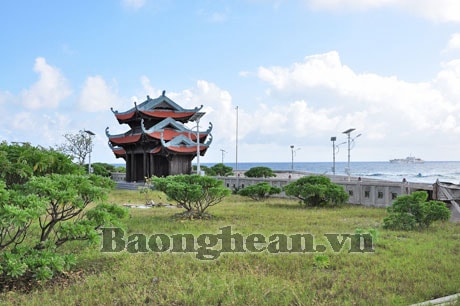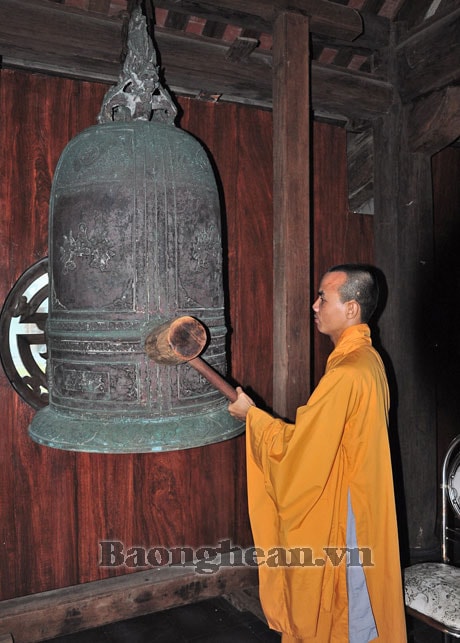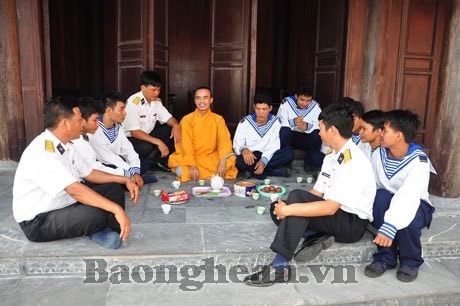Lesson 7: Peaceful temple bell sound
No one knows when Song Tu Tay Pagoda was built, perhaps hundreds of years ago when the fishing groups of the Nguyen Lords came here to exploit and catch seafood. We only know that over time, the pagoda was recently restored in 2008. The pagoda's campus has a total area of 1 hectare, including 3 rooms, 1 main hall, 2 guest houses for monks to stay. The majestic pagoda faces the sea, currently rebuilt in the architectural style of ancient pagodas in the North with two wings, curved roof tiles with eaves, the frame and pillars of the pagoda are made of precious ironwood. Song Tu Tay Pagoda has 7 statues, 6 of which are elaborately crafted from white stone, 1 smaller statue of Bodhisattva Guanyin made of jade - This is a gift from the World Buddhist Federation to Prime Minister Nguyen Tan Dung during his visit to Myanmar and the Prime Minister presented it to Song Tu Tay Pagoda.

The main gate of Song Tu Tay Pagoda faces the sea.
Together with the statue of Saint Tran, the pagoda has created a special architectural cluster imbued with the traditional spiritual culture of the Vietnamese people on Song Tu Tay Island. Every morning and evening, from the pagoda, the sound of bells echoes with the waves and the rustling wind. The bells are rung by the only abbot here, Venerable Thich Thanh Thanh. Next to a pot of tea with the pure scent of lotus flowers, the Venerable explained the meaning of the bells: According to the old ceremony, the morning bell is rung at 4 a.m., but due to the special conditions on the island, the pagoda is near the military camp, and understanding that soldiers often train at night, the Venerable only rings the bell when the alarm bell rings at 5 a.m. The morning bell awakens people to the start of a new day and how each person should live a meaningful life. The afternoon bell rings at 6:15 pm, signaling the end of a day and once again reminding everyone to live ethically, for their own benefit and the benefit of others in particular, and for the benefit of the country and people in general.

Peaceful temple bells on the island.
According to Venerable Thich Thanh Thanh, the presence of the pagoda here has met the spiritual needs of the people. Every evening, many islanders still come here to make pilgrimages to pray. The Venerable guides everyone to chant sutras, live according to Buddha's teachings, pray for peace in the country, and for the happiness of all living beings; pray for the ancestors, heroic martyrs, and victims to be liberated in the eternal world and to bless and protect all the people of our country to be well... And fishermen from Quang Ngai, Binh Dinh, Phu Yen, and Khanh Hoa provinces who regularly fish in the Truong Sa sea area often stop by to burn incense and pray to Buddha. They come to find a spiritual and mental support with the desire to reduce anxiety and fear, to be sheltered in the midst of storms and seas... Venerable Thich Thanh Thanh affirmed: "The pagoda is where people place their religious and spiritual beliefs. The pagoda has become a cultural symbol of the Vietnamese people. The restoration of Song Tu Tay pagoda once again clearly demonstrates the history of the Vietnamese people's life on the Truong Sa archipelago. Truong Sa and Hoang Sa will forever be a part of the flesh and blood of the Vietnamese Fatherland."
In the late afternoon bell ringing, we met Mr. Phan Thanh Cong and his wife and two children preparing a tray of fresh grapefruit and apples that had just been sent by ship, along with red and yellow papayas – the island’s specialty – to offer to the pagoda. Mr. Cong said: “The pagoda has been restored solemnly, the people are very excited. Going to the pagoda makes me feel more peaceful, seeing the island as no different from the mainland, so I am more confident and strong to face the storms here... As for fishermen like Mr. Nguyen Hung Phuong, Phu Yen province, coming to the pagoda and Buddha with sincerity is the main thing. In this sacred place, quietly praying, Mr. Phuong prays for himself and the Vietnamese fishermen fishing in the East Sea to avoid the erratic rain and wind, the unpredictable dangers of the seafaring profession; hoping for calm seas, calm waves and blessings for lucky trips to seek a living... Lieutenant Colonel Nguyen Trong Binh, Political Commissar of Song Tu Tay Island, shared: “When Tet comes, spring comes, soldiers on the outpost archipelago of the Fatherland always hold their guns firmly to protect sacred sovereignty. Along with offering incense at the Monument of National Duke and Commander Hung Dao Vuong, soldiers still go to the pagoda - this is a beautiful feature in the spiritual and cultural life that needs to be preserved”.

Venerable Thich Thanh Thanh talks with young soldiers.
Before the night sea, Venerable Thich Thanh Thanh told us about the concepts of religion and life, Buddhism accompanying the nation. As a true monk who had practiced meditation in many places around the world, returning to Khanh Hoi Pagoda, Nha Trang City, hearing that the islanders had submitted a petition asking monks to leave the pagoda, the Venerable immediately submitted a petition to the church to leave. First, because this place is very quiet, favorable for practice, and second, to contemplate many things. In the peaceful sound of the temple bell on Song Tu Tay, we remembered Uncle Ho through the verses: "There is a person, a Bodhisattva statue with a thousand hands and a thousand eyes / Knowing how to radiate halo from dozens of arms / There is a person, a Bodhisattva statue from the Ly Dynasty with only its head remaining / Still intact in our hearts thanks to the bun of hair left by King Hung / And a Kim Cuong statue on sturdy legs / ... keeping a Vietnamese posture...".
Article: Thanh Chung; Photo: Minh Thong (Email from Truong Sa)
